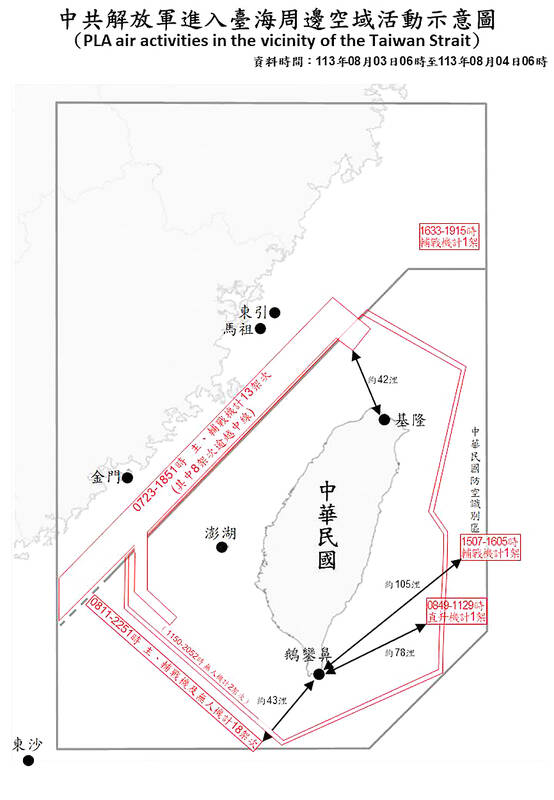Two sorties of Chinese drones were detected flying around the perimeter of Taiwan proper between 6am on Saturday and 6am yesterday, according to the Ministry of National Defense.
A total of 31 Chinese military aircraft — which included several drones — and 12 Chinese warships were detected operating in and near the Taiwan Strait over the 24-hour period, the ministry said.
Institute for National Defense and Security Research fellow Su Tzu-yun (蘇紫雲) said the maneuvers were likely aimed at affecting public sentiment in Taiwan, demonstrating defiance toward the US’ two-plus-two talks with India and Australia, and enacting China’s polarized strategy of pushing war and peace as two alternatives against Taiwan.

Photo courtesy of the Ministry of National Defense
Two of the drones had entered Taiwan’s air defense identification zone (ADIZ) from the northwest separately after 11:50am on Saturday, and then circled Taiwan proper, the ministry said.
Japan’s Ministry of Defense on Saturday also detected a Chinese drone flying in waters over the East China Sea between Taiwan and Yonaguni Island in Japan’s Okinawa Prefecture, before turning south toward the Bashi Channel, it said.
The Japanese ministry also detected a Shaanxi Y-9 electronic warfare aircraft flying over the East China Sea in airspace between Okinawa Island and Miyako Island in Okinawa Prefecture, it said.
Beijing frequently reacts to international cooperation in the region by holding drills in or near the Taiwan Strait, Su said.
Citing an example, he said that it had held drills following an announcement by Vietnam and the Philippines about planned joint naval exercises.
Beijing’s attitude toward Taiwan was also demonstrated on China’s People’s Liberation Army Day on Thursday last week, when it published through state media cartoons depicting attacks on Taiwanese cities including Taipei, Kaohsiung and Hualien, he said.
Separately, Democratic Progressive Party Legislator Wang Ting-yu (王定宇) yesterday said he believes that China’s recent military exercises near Taiwan were part of its cognitive warfare efforts, and were aimed at intimidating the Taiwanese public.
Taiwan should improve its defense capabilities and integrate international cooperation into its strategy to better prepare itself against Chinese threats, he said.
However, aggression from China would only result in democracies strengthening ties and cooperation, he said, adding that Taiwan would face any threat head-on.

The High Prosecutors’ Office yesterday withdrew an appeal against the acquittal of a former bank manager 22 years after his death, marking Taiwan’s first instance of prosecutors rendering posthumous justice to a wrongfully convicted defendant. Chu Ching-en (諸慶恩) — formerly a manager at the Taipei branch of BNP Paribas — was in 1999 accused by Weng Mao-chung (翁茂鍾), then-president of Chia Her Industrial Co, of forging a request for a fixed deposit of US$10 million by I-Hwa Industrial Co, a subsidiary of Chia Her, which was used as collateral. Chu was ruled not guilty in the first trial, but was found guilty

DEADLOCK: As the commission is unable to forum a quorum to review license renewal applications, the channel operators are not at fault and can air past their license date The National Communications Commission (NCC) yesterday said that the Public Television Service (PTS) and 36 other television and radio broadcasters could continue airing, despite the commission’s inability to meet a quorum to review their license renewal applications. The licenses of PTS and the other channels are set to expire between this month and June. The National Communications Commission Organization Act (國家通訊傳播委員會組織法) stipulates that the commission must meet the mandated quorum of four to hold a valid meeting. The seven-member commission currently has only three commissioners. “We have informed the channel operators of the progress we have made in reviewing their license renewal applications, and

‘DENIAL DEFENSE’: The US would increase its military presence with uncrewed ships, and submarines, while boosting defense in the Indo-Pacific, a Pete Hegseth memo said The US is reorienting its military strategy to focus primarily on deterring a potential Chinese invasion of Taiwan, a memo signed by US Secretary of Defense Pete Hegseth showed. The memo also called on Taiwan to increase its defense spending. The document, known as the “Interim National Defense Strategic Guidance,” was distributed this month and detailed the national defense plans of US President Donald Trump’s administration, an article in the Washington Post said on Saturday. It outlines how the US can prepare for a potential war with China and defend itself from threats in the “near abroad,” including Greenland and the Panama

Taiwan People’s Party (TPP) Chairman Huang Kuo-chang (黃國昌) yesterday appealed to the authorities to release former Taipei mayor Ko Wen-je (柯文哲) from pretrial detention amid conflicting reports about his health. The TPP at a news conference on Thursday said that Ko should be released to a hospital for treatment, adding that he has blood in his urine and had spells of pain and nausea followed by vomiting over the past three months. Hsieh Yen-yau (謝炎堯), a retired professor of internal medicine and Ko’s former teacher, said that Ko’s symptoms aligned with gallstones, kidney inflammation and potentially dangerous heart conditions. Ko, charged with